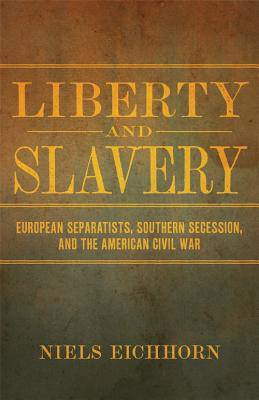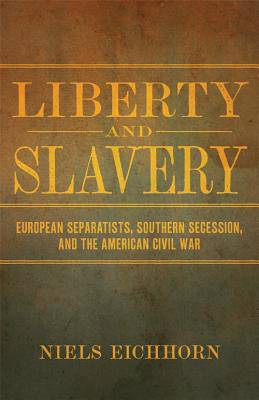
- Retrait gratuit dans votre magasin Club
- 7.000.000 titres dans notre catalogue
- Payer en toute sécurité
- Toujours un magasin près de chez vous
- Retrait gratuit dans votre magasin Club
- 7.000.000 titres dans notre catalogue
- Payer en toute sécurité
- Toujours un magasin près de chez vous
Liberty and Slavery
European Separatists, Southern Secession, and the American Civil War
Niels Eichhorn
68,95 €
+ 137 points
Description
In Liberty and Slavery, Niels Eichhorn examines the language of slavery, which he considers central to revolutionary struggles, especially those waged in Europe in the nineteenth century. Eichhorn begins in 1830 with separatist movements in Greece, Belgium, and Poland, which laid the foundation for rebellions undertaken later in the century, and then shifts focus to the 1848 uprisings in Ireland, Hungary, and Schleswig-Holstein. He argues that revolutionaries embraced or rejected the language of slavery as they saw fit, using it to justify their rebellions and larger goals.
The failure of these insurgencies propelled a wave of revolutionary migrants across the Atlantic world. Those who journeyed to the United States felt the need to adjust to the political and sectional divisions in their new home. Eichhorn shows that separatism was widespread during this period; the secessionist aims of the American Confederacy were by no means unique. Additionally, Eichhorn explores these migrants' motivations for shunning the Confederacy during the American Civil War. Having been steeped in the language of slavery and separatism, they naturally sided with the Union when the sectional crisis culminated in civil war in 1861.Spécifications
Parties prenantes
- Auteur(s) :
- Editeur:
Contenu
- Nombre de pages :
- 216
- Langue:
- Anglais
- Collection :
Caractéristiques
- EAN:
- 9780807171677
- Date de parution :
- 09-10-19
- Format:
- Livre relié
- Format numérique:
- Genaaid
- Dimensions :
- 140 mm x 216 mm
- Poids :
- 421 g







